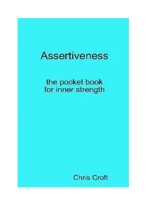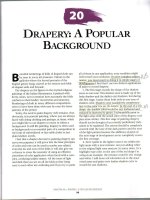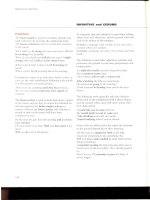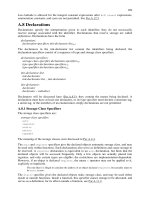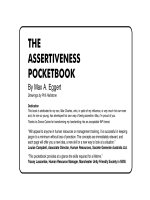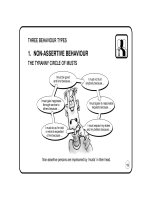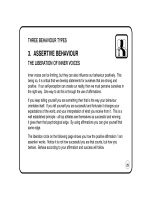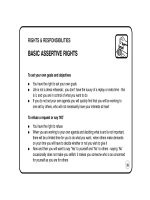THE ASSERTIVENESS POCKET BOOK phần 9 ppt
Bạn đang xem bản rút gọn của tài liệu. Xem và tải ngay bản đầy đủ của tài liệu tại đây (126.81 KB, 13 trang )
ASSERTIVENESS SKILLS
FOGGING
Fogging is useful when someone is putting pressure on you to do something that is
really not in your best interest, and you would rather not do it. Thus your response to the
request is to put up a fog.
Listen to what the person says, and decide whether or not you wish to comply. If not,
then using their words, or similar, acknowledge their need but state your case. In this
way you show the person that you have understood their request, but that you are not
going to comply. This method is a very polite method of saying ‘No’.
REQUEST RESPONSE
‘I want it now’ ‘I can see why you would want that but my priority is ’
‘You should help me’ ‘Perhaps I should but right now I have other priorities.’
‘This is important’ ‘Of course it is important but not as important as ’
‘I need this’ ‘I am sure you do but it is just not possible now.’
By using this technique you are less likely to be manipulated into doing something you
would rather not and yet you cannot be accused of recognising the other person’s need.
83
ASSERTIVENESS SKILLS
NEGATIVE ENQUIRY
Once you have mastered Negative Assertion and Fogging you will be ready for Negative
Enquiry, which is real fun. Here you invite extra criticism and/or examples so that you
have the benefit of additional feedback.
ACCUSATION
‘You’re lazy’ ‘Oh really, in what way specifically?’
‘You’re always late’ ‘Always? How do you know that for a fact?’
‘You’re stupid’ ‘My understanding may be different from yours, what exactly do
you mean by that?’
‘You’re selfish’ ‘Can you explain why this particular instance has caused you to
brand me with such a label?’
If the person is genuine and cares for you, such replies will lead to real feedback. Then
you can decide whether the accusation is justified, and whether you want to do anything
about it (see page 58 onwards).
84
ASSERTIVENESS SKILLS
POWER WORDS
In being assertive certain words are very powerful indeed and used in the correct context
are exceptionally persuasive.
Power words and phrases are:
85
No
If
Thank
you
When
ASSERTIVENESS SKILLS
NO
‘No’ is one of the most difficult words to say to another person. This is usually because
we fear the loss of their goodwill or regard.
We naturally wish to be thought of as kind, helpful, considerate people. It makes us feel
good to please others, so in the short term it is easier to say ‘yes’ than say ‘no’.
Here is a checklist for when you want to say `NO’:
1. Do I really want this or am I pleasing someone else?
2. What is the benefit to me of saying ‘yes’?
3. If I do it will I enjoy it?
4. Do I have to say ‘yes’ or ‘no’ right now; is it to my advantage to delay my decision?
5. How do I feel about the request? How do I feel emotionally about it?
6. Do I need more information before I make my decision?
7. Do I want an alternative?
8. What is the cost of saying ‘no’?
The checklist is a long one so you can always use number four to give yourself some
thinking time (and go back to this list).
86
ASSERTIVENESS SKILLS
HOW TO SAY NO
● Just say ‘no’
Do not preface it with an ‘I’m sorry but ’
or tentative language ‘I would really
like to but ’
● Give an explanation of your feelings:
‘It does not feel right to ’
‘I don’t like to ’
‘I would feel compromised to ’
● Give an explanation of your reasons:
‘Because I must do such and such’
‘Because I am already committed’
‘Because I don’t have the time’
● If appropriate thank the person:
‘Thank you for thinking of me’
‘Thank you for the invitation’
87
ASSERTIVENESS SKILLS
THANK YOU
‘Thank you’ is an interesting phrase. We are brought up to say ‘please’ when we want
something. But, if we say ‘please’ we are asking the person for something.
Consequently, they have the initiative because they can say ‘yes’ or ‘no’.
We are taught to say ‘thank you’ when we have been given something that we have
requested. But something interesting happens when we say ‘thank you’ where we would
normally say ‘please’. The ‘thank you’ becomes assumptive. In other words you
assume that what you ask for will be done or given.
Used with appropriate assertive body language the judicial use of ‘thank you’ can be
exceptionally powerful.
● ‘I would like to be quiet now. Thank you.’
● ‘I would like you to help me. Thank you.’
● ‘I want you to pay attention. Thank you.’
88
ASSERTIVENESS SKILLS
IF
The conjunction ‘if’ is exceptionally powerful when you want to make a concession or
give something away. The ‘if’ acts as a piece of elastic with which you can pull back the
concession, if you don’t get what you want.
‘If’ becomes conditional:
● ‘If you do this then I will ’
● ‘If you work harder I will ’
● ‘If you co-operate you can have ’
Most grandmothers know this because of Grandma’s Law of Vitamin Intake for Children,
which goes:
‘If you eat your vegetables you can have your pudding.’
Notice how a low priority option is coupled with a high priority choice.
In life most of us let people have the ‘pudding’ first, hoping that they will do the decent
thing and give us what we want. If only life was that simple!
89
ASSERTIVENESS SKILLS
WHEN
This is another conjunction which is the
same as `if’ when you make it conditional.
It has the same power:
● ‘When you ’
● ‘When the work has been completed ’
● ‘When you stop making accusations ’
90
ASSERTIVE ACTIVITIES
91
ASSERTIVE ACTIVITIES
GENERAL ADVICE
Before you start on the activities here is some advice to assist you in your progress to
become more assertive.
1. Expect surprise and even opposition
It has taken a lifetime to get you to behave the way you do now, so do not expect to
change overnight. Also remember that those who are close to you will not expect your
behaviour to change. There may be others who have a vested interest in keeping you
non-assertive or aggressive.
This means that when you decide to change your behaviour, as well as disciplining
yourself, you must also expect surprise, even opposition, from others who know and
have a vested interest in the ‘old you’.
2. ‘By the inch it’s a cinch but by the yard it is very hard’
It is unwise to set yourself too ambitious targets - start with acorns and let them grow
slowly into oaks. Go for small increments of change and build on them.
92
ASSERTIVE ACTIVITIES
GENERAL ADVICE
3. Expect failure and use it
Failure is part of change. When you try anything new,
but especially behaviour, it is unlikely that you will get
it right first time. You get it wrong before you get it
right. Be both realistic and resilient when you fail.
‘If at first you don’t succeed, try harder’.
Remember, success only comes before
work in a dictionary!!
4. Allow for slippage
When you squeeze a ball you create an
indentation, but when you stop the ball reverts
to its original shape. Human behaviour is just
like that ball - it will revert to its old comfortable
ways. So expect slippage, but do not give in to it.
93
ASSERTIVE ACTIVITIES
GENERAL ADVICE
5. It takes time
Behaviour changes slowly. Crash diets or crash exercises do not work; nor do crash
behaviour changes. Just think about the simple skill of learning to drive, with the hours
of instruction and practice it requires. To become assertive takes just as much time and
effort, perhaps even more.
Remember
THOUGHTS lead to
ACTIONS which lead to
HABITS which lead to
CHARACTER which leads to
PERSONALITY which leads to
THE NEW YOU
Just as for smokers the body fights against giving up nicotine, so your present mindset
will resist you making changes. It will take time for you to settle down to the new
assertive you.
94
ASSERTIVE ACTIVITIES
GENERAL ADVICE
6. Set SMART S - Specific - define exactly what you want
goals M - Measurable - what will be the success criteria
A - Appropriate - ensure they are appropriate for you
R - Realistic - they must be feasible
T - Timebound - by when are you going to do it
Goals are dreams that you are going to make real. They are not miracles - you won’t be
the first person to fly by flapping your arms. If you weren’t born in America you cannot
be President. If you’re 55 you are not likely to be an Olympic swimmer. But you can
easily be assertive by:
● Stating what you want
● Stating your limits
● Saying ‘No’
Most people find committing their goals to writing very helpful.
Tip: Keep a log book or journal where you record your thoughts, objectives, goals and
learning points. It is good discipline and will help you marshal your thoughts, and be more
specific and focused. It is also very motivating to look back and see what you have achieved.
95
● Getting what you pay for ● Giving a speech or
● Demanding respect a presentation
● Changing your mind
